Business Ethics and Corporate Governance: LendLease Case Study Report
VerifiedAdded on 2020/05/11
|16
|4207
|75
Case Study
AI Summary
This report presents an analysis of the LendLease case, focusing on the ethical issues arising from the company's attempts to evade the Australian Building and Construction Commission (ABCC) code. The case highlights LendLease's anti-competitive behavior, particularly its efforts to impose restrictive agreements on subcontractors. The report examines the ethical dilemmas, the impact on various stakeholders, including workers, small businesses, and competitors, and the violation of ethical principles such as utilitarianism and business sustainability. It discusses the company's disregard for human rights and its focus on maximizing profits at the expense of fair competition. The analysis includes recommendations for avoiding such incidents in the future, emphasizing the importance of ethical decision-making and adherence to corporate governance principles. The report underscores the need for businesses to consider the impact of their actions on all stakeholders and to uphold ethical standards to ensure long-term sustainability and a positive reputation.

Paraphrase This Document
Need a fresh take? Get an instant paraphrase of this document with our AI Paraphraser
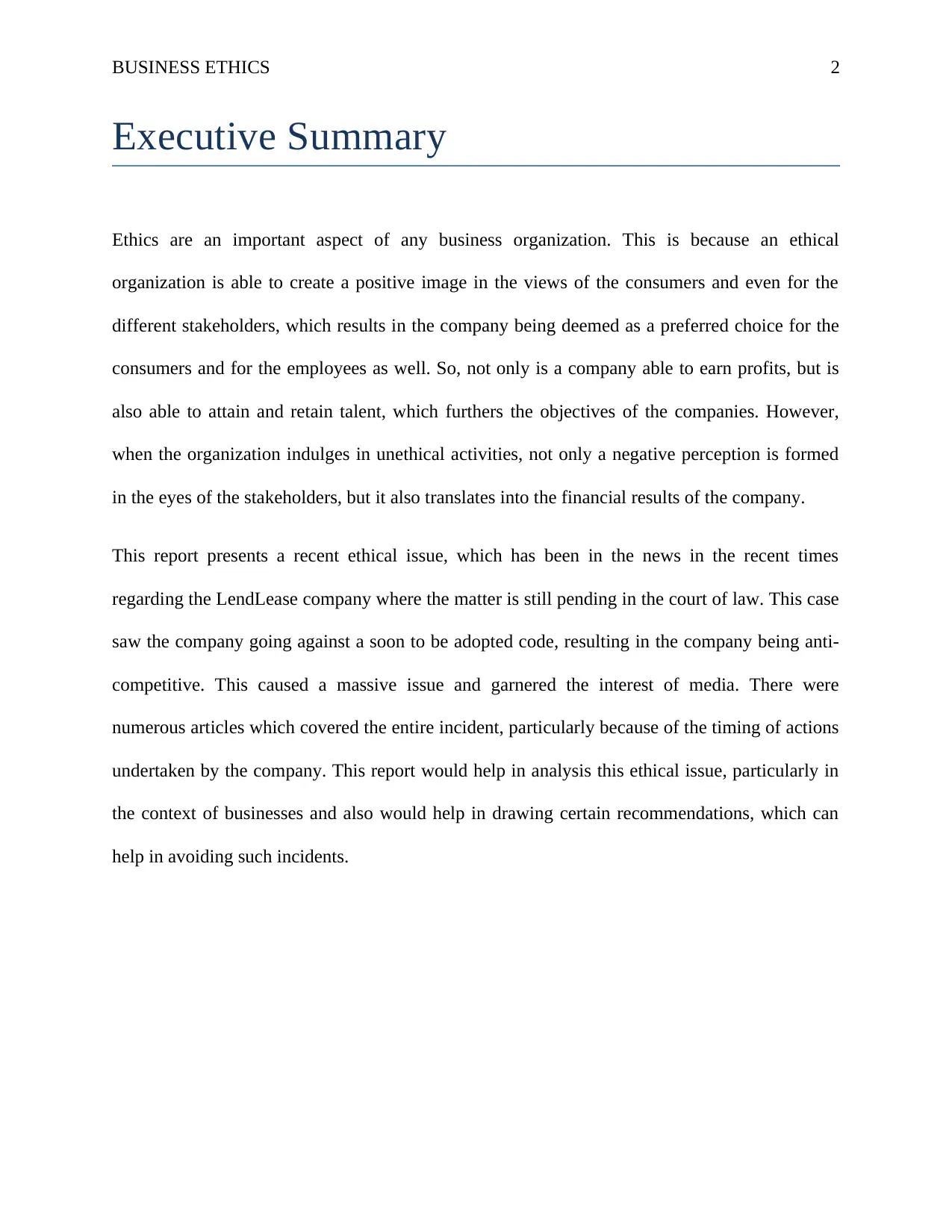
BUSINESS ETHICS 2
Executive Summary
Ethics are an important aspect of any business organization. This is because an ethical
organization is able to create a positive image in the views of the consumers and even for the
different stakeholders, which results in the company being deemed as a preferred choice for the
consumers and for the employees as well. So, not only is a company able to earn profits, but is
also able to attain and retain talent, which furthers the objectives of the companies. However,
when the organization indulges in unethical activities, not only a negative perception is formed
in the eyes of the stakeholders, but it also translates into the financial results of the company.
This report presents a recent ethical issue, which has been in the news in the recent times
regarding the LendLease company where the matter is still pending in the court of law. This case
saw the company going against a soon to be adopted code, resulting in the company being anti-
competitive. This caused a massive issue and garnered the interest of media. There were
numerous articles which covered the entire incident, particularly because of the timing of actions
undertaken by the company. This report would help in analysis this ethical issue, particularly in
the context of businesses and also would help in drawing certain recommendations, which can
help in avoiding such incidents.
Executive Summary
Ethics are an important aspect of any business organization. This is because an ethical
organization is able to create a positive image in the views of the consumers and even for the
different stakeholders, which results in the company being deemed as a preferred choice for the
consumers and for the employees as well. So, not only is a company able to earn profits, but is
also able to attain and retain talent, which furthers the objectives of the companies. However,
when the organization indulges in unethical activities, not only a negative perception is formed
in the eyes of the stakeholders, but it also translates into the financial results of the company.
This report presents a recent ethical issue, which has been in the news in the recent times
regarding the LendLease company where the matter is still pending in the court of law. This case
saw the company going against a soon to be adopted code, resulting in the company being anti-
competitive. This caused a massive issue and garnered the interest of media. There were
numerous articles which covered the entire incident, particularly because of the timing of actions
undertaken by the company. This report would help in analysis this ethical issue, particularly in
the context of businesses and also would help in drawing certain recommendations, which can
help in avoiding such incidents.
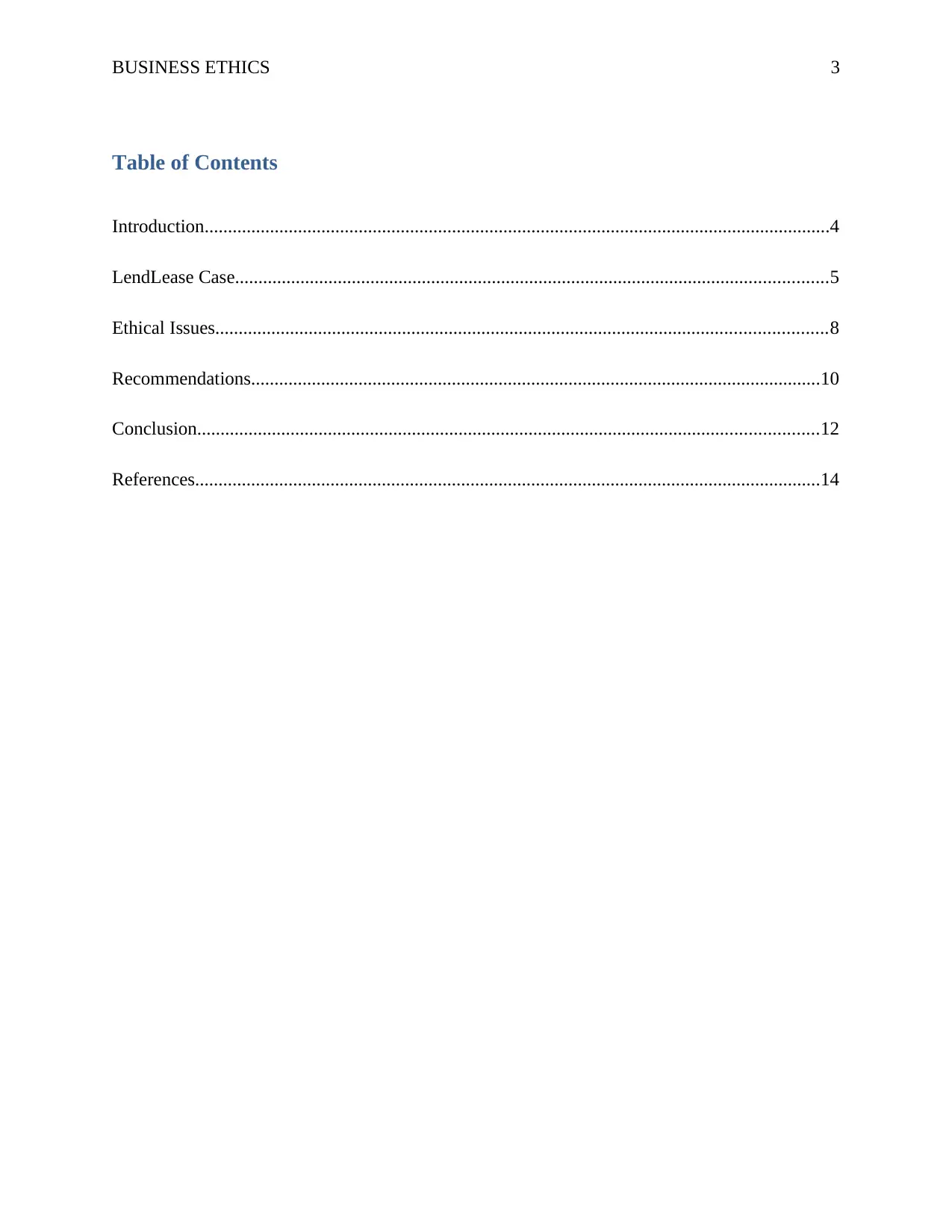
BUSINESS ETHICS 3
Table of Contents
Introduction......................................................................................................................................4
LendLease Case...............................................................................................................................5
Ethical Issues...................................................................................................................................8
Recommendations..........................................................................................................................10
Conclusion.....................................................................................................................................12
References......................................................................................................................................14
Table of Contents
Introduction......................................................................................................................................4
LendLease Case...............................................................................................................................5
Ethical Issues...................................................................................................................................8
Recommendations..........................................................................................................................10
Conclusion.....................................................................................................................................12
References......................................................................................................................................14
⊘ This is a preview!⊘
Do you want full access?
Subscribe today to unlock all pages.

Trusted by 1+ million students worldwide
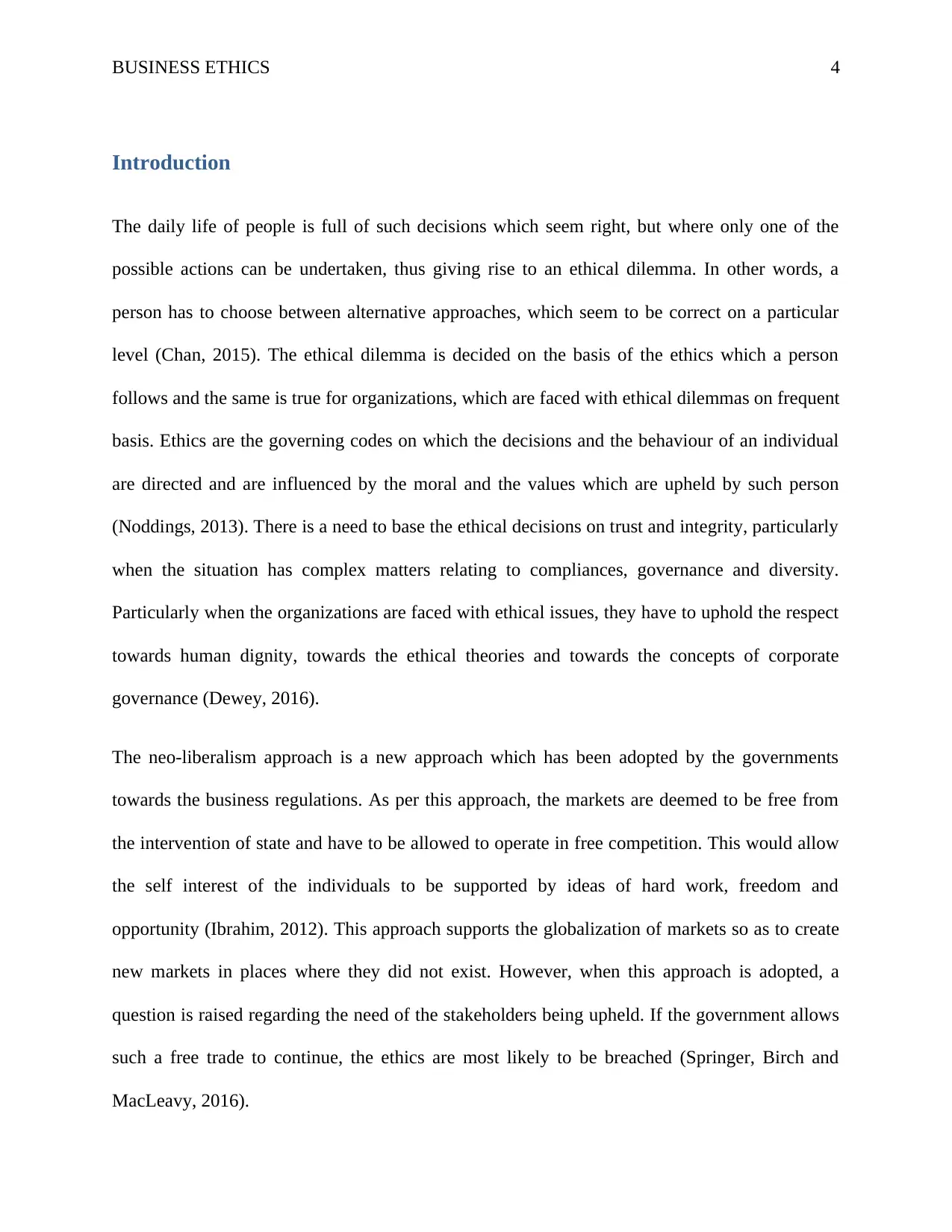
BUSINESS ETHICS 4
Introduction
The daily life of people is full of such decisions which seem right, but where only one of the
possible actions can be undertaken, thus giving rise to an ethical dilemma. In other words, a
person has to choose between alternative approaches, which seem to be correct on a particular
level (Chan, 2015). The ethical dilemma is decided on the basis of the ethics which a person
follows and the same is true for organizations, which are faced with ethical dilemmas on frequent
basis. Ethics are the governing codes on which the decisions and the behaviour of an individual
are directed and are influenced by the moral and the values which are upheld by such person
(Noddings, 2013). There is a need to base the ethical decisions on trust and integrity, particularly
when the situation has complex matters relating to compliances, governance and diversity.
Particularly when the organizations are faced with ethical issues, they have to uphold the respect
towards human dignity, towards the ethical theories and towards the concepts of corporate
governance (Dewey, 2016).
The neo-liberalism approach is a new approach which has been adopted by the governments
towards the business regulations. As per this approach, the markets are deemed to be free from
the intervention of state and have to be allowed to operate in free competition. This would allow
the self interest of the individuals to be supported by ideas of hard work, freedom and
opportunity (Ibrahim, 2012). This approach supports the globalization of markets so as to create
new markets in places where they did not exist. However, when this approach is adopted, a
question is raised regarding the need of the stakeholders being upheld. If the government allows
such a free trade to continue, the ethics are most likely to be breached (Springer, Birch and
MacLeavy, 2016).
Introduction
The daily life of people is full of such decisions which seem right, but where only one of the
possible actions can be undertaken, thus giving rise to an ethical dilemma. In other words, a
person has to choose between alternative approaches, which seem to be correct on a particular
level (Chan, 2015). The ethical dilemma is decided on the basis of the ethics which a person
follows and the same is true for organizations, which are faced with ethical dilemmas on frequent
basis. Ethics are the governing codes on which the decisions and the behaviour of an individual
are directed and are influenced by the moral and the values which are upheld by such person
(Noddings, 2013). There is a need to base the ethical decisions on trust and integrity, particularly
when the situation has complex matters relating to compliances, governance and diversity.
Particularly when the organizations are faced with ethical issues, they have to uphold the respect
towards human dignity, towards the ethical theories and towards the concepts of corporate
governance (Dewey, 2016).
The neo-liberalism approach is a new approach which has been adopted by the governments
towards the business regulations. As per this approach, the markets are deemed to be free from
the intervention of state and have to be allowed to operate in free competition. This would allow
the self interest of the individuals to be supported by ideas of hard work, freedom and
opportunity (Ibrahim, 2012). This approach supports the globalization of markets so as to create
new markets in places where they did not exist. However, when this approach is adopted, a
question is raised regarding the need of the stakeholders being upheld. If the government allows
such a free trade to continue, the ethics are most likely to be breached (Springer, Birch and
MacLeavy, 2016).
Paraphrase This Document
Need a fresh take? Get an instant paraphrase of this document with our AI Paraphraser
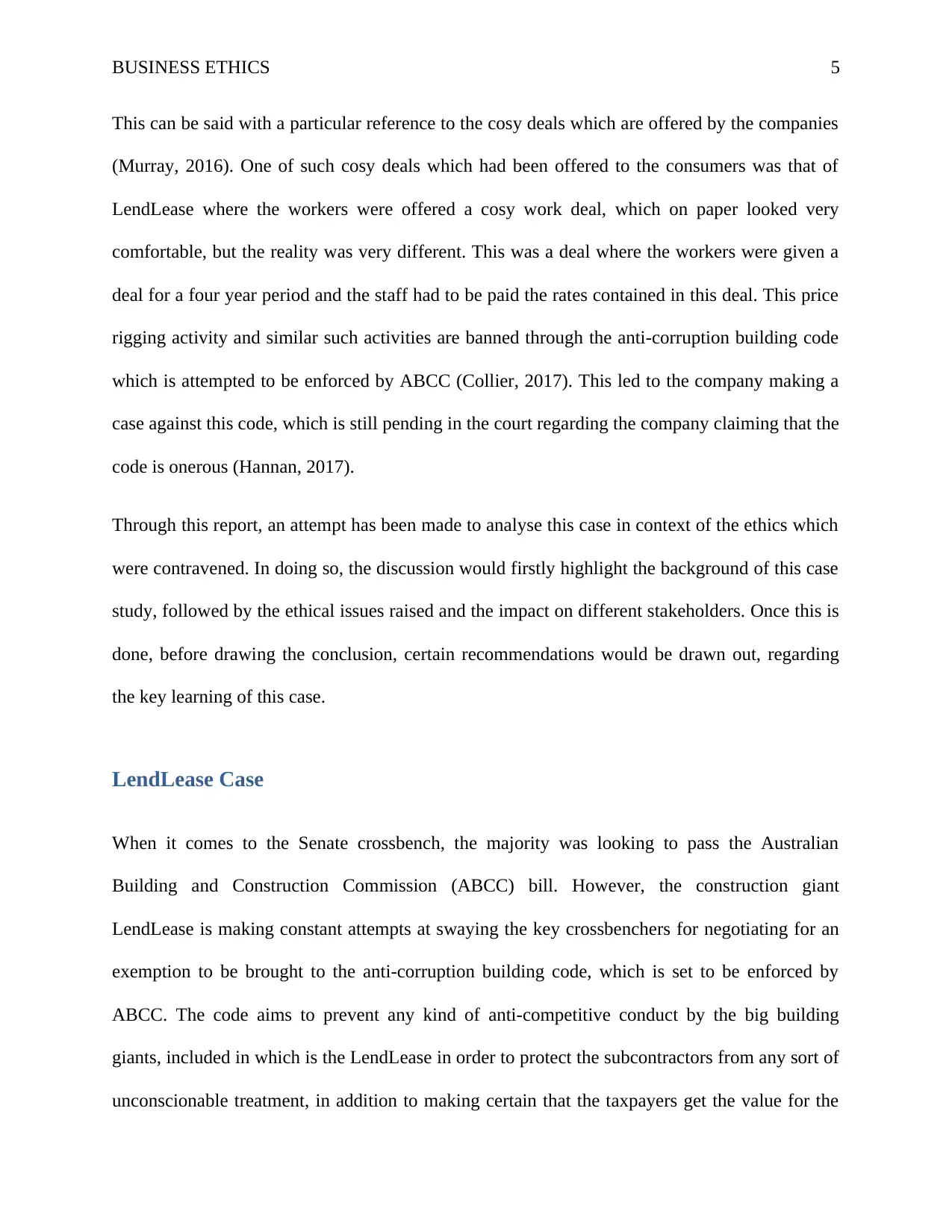
BUSINESS ETHICS 5
This can be said with a particular reference to the cosy deals which are offered by the companies
(Murray, 2016). One of such cosy deals which had been offered to the consumers was that of
LendLease where the workers were offered a cosy work deal, which on paper looked very
comfortable, but the reality was very different. This was a deal where the workers were given a
deal for a four year period and the staff had to be paid the rates contained in this deal. This price
rigging activity and similar such activities are banned through the anti-corruption building code
which is attempted to be enforced by ABCC (Collier, 2017). This led to the company making a
case against this code, which is still pending in the court regarding the company claiming that the
code is onerous (Hannan, 2017).
Through this report, an attempt has been made to analyse this case in context of the ethics which
were contravened. In doing so, the discussion would firstly highlight the background of this case
study, followed by the ethical issues raised and the impact on different stakeholders. Once this is
done, before drawing the conclusion, certain recommendations would be drawn out, regarding
the key learning of this case.
LendLease Case
When it comes to the Senate crossbench, the majority was looking to pass the Australian
Building and Construction Commission (ABCC) bill. However, the construction giant
LendLease is making constant attempts at swaying the key crossbenchers for negotiating for an
exemption to be brought to the anti-corruption building code, which is set to be enforced by
ABCC. The code aims to prevent any kind of anti-competitive conduct by the big building
giants, included in which is the LendLease in order to protect the subcontractors from any sort of
unconscionable treatment, in addition to making certain that the taxpayers get the value for the
This can be said with a particular reference to the cosy deals which are offered by the companies
(Murray, 2016). One of such cosy deals which had been offered to the consumers was that of
LendLease where the workers were offered a cosy work deal, which on paper looked very
comfortable, but the reality was very different. This was a deal where the workers were given a
deal for a four year period and the staff had to be paid the rates contained in this deal. This price
rigging activity and similar such activities are banned through the anti-corruption building code
which is attempted to be enforced by ABCC (Collier, 2017). This led to the company making a
case against this code, which is still pending in the court regarding the company claiming that the
code is onerous (Hannan, 2017).
Through this report, an attempt has been made to analyse this case in context of the ethics which
were contravened. In doing so, the discussion would firstly highlight the background of this case
study, followed by the ethical issues raised and the impact on different stakeholders. Once this is
done, before drawing the conclusion, certain recommendations would be drawn out, regarding
the key learning of this case.
LendLease Case
When it comes to the Senate crossbench, the majority was looking to pass the Australian
Building and Construction Commission (ABCC) bill. However, the construction giant
LendLease is making constant attempts at swaying the key crossbenchers for negotiating for an
exemption to be brought to the anti-corruption building code, which is set to be enforced by
ABCC. The code aims to prevent any kind of anti-competitive conduct by the big building
giants, included in which is the LendLease in order to protect the subcontractors from any sort of
unconscionable treatment, in addition to making certain that the taxpayers get the value for the
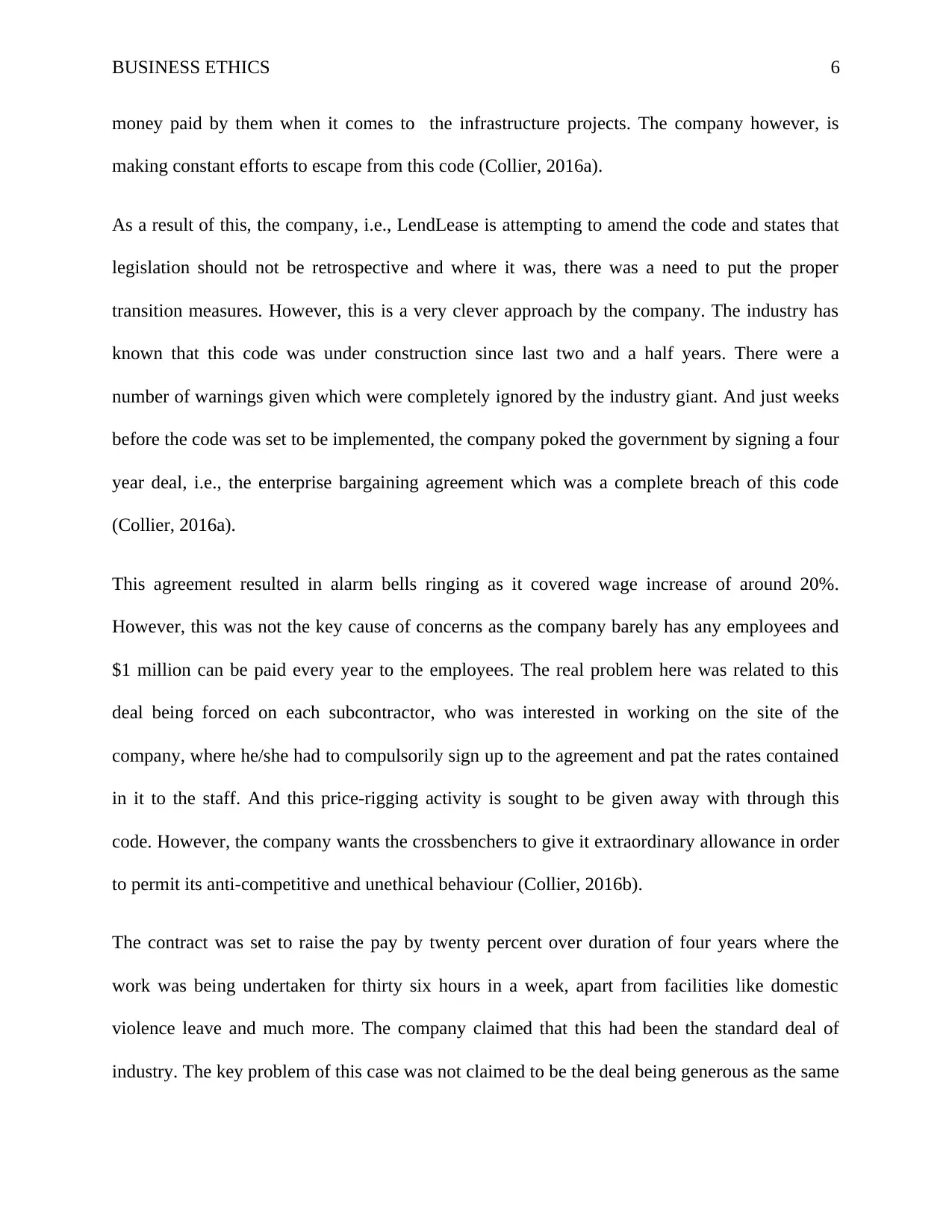
BUSINESS ETHICS 6
money paid by them when it comes to the infrastructure projects. The company however, is
making constant efforts to escape from this code (Collier, 2016a).
As a result of this, the company, i.e., LendLease is attempting to amend the code and states that
legislation should not be retrospective and where it was, there was a need to put the proper
transition measures. However, this is a very clever approach by the company. The industry has
known that this code was under construction since last two and a half years. There were a
number of warnings given which were completely ignored by the industry giant. And just weeks
before the code was set to be implemented, the company poked the government by signing a four
year deal, i.e., the enterprise bargaining agreement which was a complete breach of this code
(Collier, 2016a).
This agreement resulted in alarm bells ringing as it covered wage increase of around 20%.
However, this was not the key cause of concerns as the company barely has any employees and
$1 million can be paid every year to the employees. The real problem here was related to this
deal being forced on each subcontractor, who was interested in working on the site of the
company, where he/she had to compulsorily sign up to the agreement and pat the rates contained
in it to the staff. And this price-rigging activity is sought to be given away with through this
code. However, the company wants the crossbenchers to give it extraordinary allowance in order
to permit its anti-competitive and unethical behaviour (Collier, 2016b).
The contract was set to raise the pay by twenty percent over duration of four years where the
work was being undertaken for thirty six hours in a week, apart from facilities like domestic
violence leave and much more. The company claimed that this had been the standard deal of
industry. The key problem of this case was not claimed to be the deal being generous as the same
money paid by them when it comes to the infrastructure projects. The company however, is
making constant efforts to escape from this code (Collier, 2016a).
As a result of this, the company, i.e., LendLease is attempting to amend the code and states that
legislation should not be retrospective and where it was, there was a need to put the proper
transition measures. However, this is a very clever approach by the company. The industry has
known that this code was under construction since last two and a half years. There were a
number of warnings given which were completely ignored by the industry giant. And just weeks
before the code was set to be implemented, the company poked the government by signing a four
year deal, i.e., the enterprise bargaining agreement which was a complete breach of this code
(Collier, 2016a).
This agreement resulted in alarm bells ringing as it covered wage increase of around 20%.
However, this was not the key cause of concerns as the company barely has any employees and
$1 million can be paid every year to the employees. The real problem here was related to this
deal being forced on each subcontractor, who was interested in working on the site of the
company, where he/she had to compulsorily sign up to the agreement and pat the rates contained
in it to the staff. And this price-rigging activity is sought to be given away with through this
code. However, the company wants the crossbenchers to give it extraordinary allowance in order
to permit its anti-competitive and unethical behaviour (Collier, 2016b).
The contract was set to raise the pay by twenty percent over duration of four years where the
work was being undertaken for thirty six hours in a week, apart from facilities like domestic
violence leave and much more. The company claimed that this had been the standard deal of
industry. The key problem of this case was not claimed to be the deal being generous as the same
⊘ This is a preview!⊘
Do you want full access?
Subscribe today to unlock all pages.

Trusted by 1+ million students worldwide
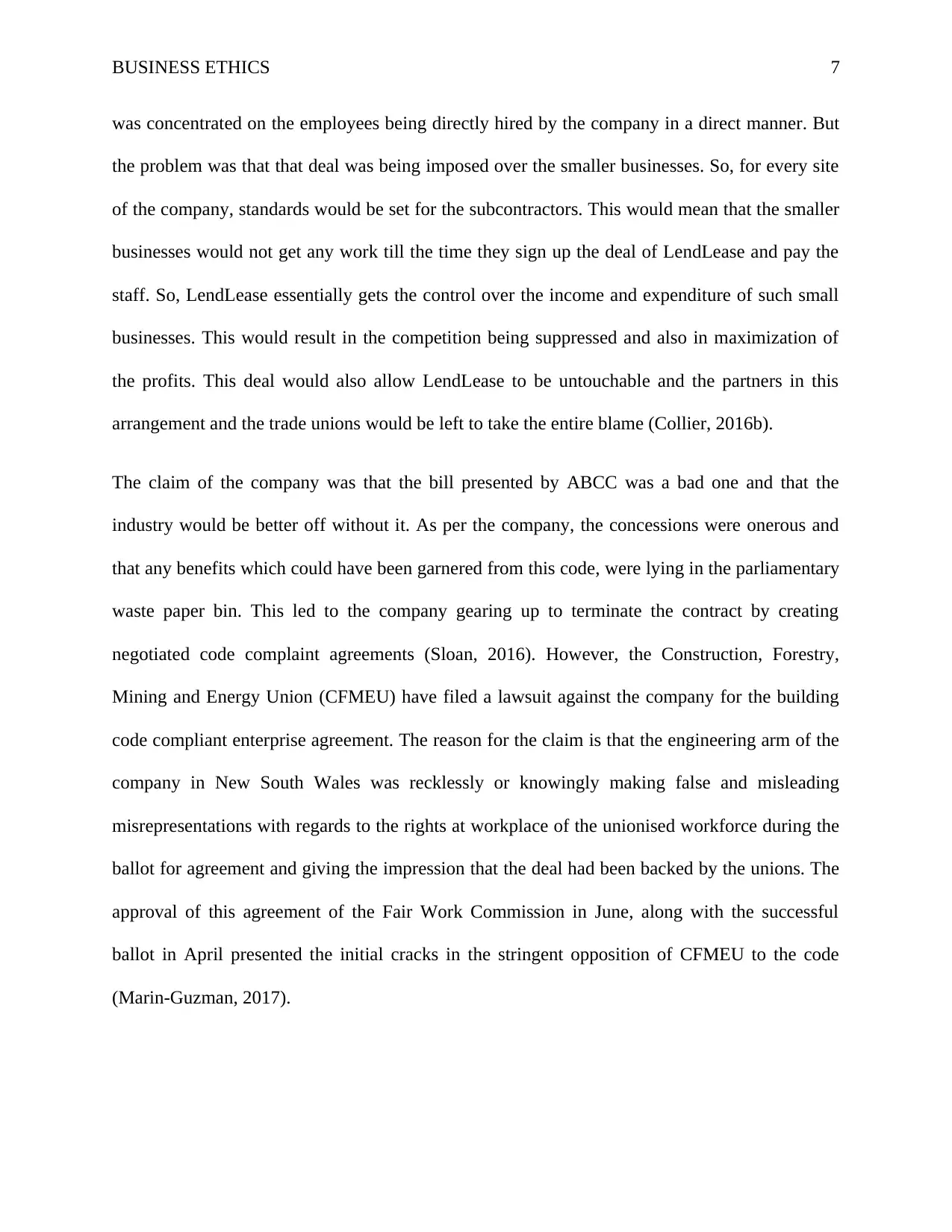
BUSINESS ETHICS 7
was concentrated on the employees being directly hired by the company in a direct manner. But
the problem was that that deal was being imposed over the smaller businesses. So, for every site
of the company, standards would be set for the subcontractors. This would mean that the smaller
businesses would not get any work till the time they sign up the deal of LendLease and pay the
staff. So, LendLease essentially gets the control over the income and expenditure of such small
businesses. This would result in the competition being suppressed and also in maximization of
the profits. This deal would also allow LendLease to be untouchable and the partners in this
arrangement and the trade unions would be left to take the entire blame (Collier, 2016b).
The claim of the company was that the bill presented by ABCC was a bad one and that the
industry would be better off without it. As per the company, the concessions were onerous and
that any benefits which could have been garnered from this code, were lying in the parliamentary
waste paper bin. This led to the company gearing up to terminate the contract by creating
negotiated code complaint agreements (Sloan, 2016). However, the Construction, Forestry,
Mining and Energy Union (CFMEU) have filed a lawsuit against the company for the building
code compliant enterprise agreement. The reason for the claim is that the engineering arm of the
company in New South Wales was recklessly or knowingly making false and misleading
misrepresentations with regards to the rights at workplace of the unionised workforce during the
ballot for agreement and giving the impression that the deal had been backed by the unions. The
approval of this agreement of the Fair Work Commission in June, along with the successful
ballot in April presented the initial cracks in the stringent opposition of CFMEU to the code
(Marin-Guzman, 2017).
was concentrated on the employees being directly hired by the company in a direct manner. But
the problem was that that deal was being imposed over the smaller businesses. So, for every site
of the company, standards would be set for the subcontractors. This would mean that the smaller
businesses would not get any work till the time they sign up the deal of LendLease and pay the
staff. So, LendLease essentially gets the control over the income and expenditure of such small
businesses. This would result in the competition being suppressed and also in maximization of
the profits. This deal would also allow LendLease to be untouchable and the partners in this
arrangement and the trade unions would be left to take the entire blame (Collier, 2016b).
The claim of the company was that the bill presented by ABCC was a bad one and that the
industry would be better off without it. As per the company, the concessions were onerous and
that any benefits which could have been garnered from this code, were lying in the parliamentary
waste paper bin. This led to the company gearing up to terminate the contract by creating
negotiated code complaint agreements (Sloan, 2016). However, the Construction, Forestry,
Mining and Energy Union (CFMEU) have filed a lawsuit against the company for the building
code compliant enterprise agreement. The reason for the claim is that the engineering arm of the
company in New South Wales was recklessly or knowingly making false and misleading
misrepresentations with regards to the rights at workplace of the unionised workforce during the
ballot for agreement and giving the impression that the deal had been backed by the unions. The
approval of this agreement of the Fair Work Commission in June, along with the successful
ballot in April presented the initial cracks in the stringent opposition of CFMEU to the code
(Marin-Guzman, 2017).
Paraphrase This Document
Need a fresh take? Get an instant paraphrase of this document with our AI Paraphraser
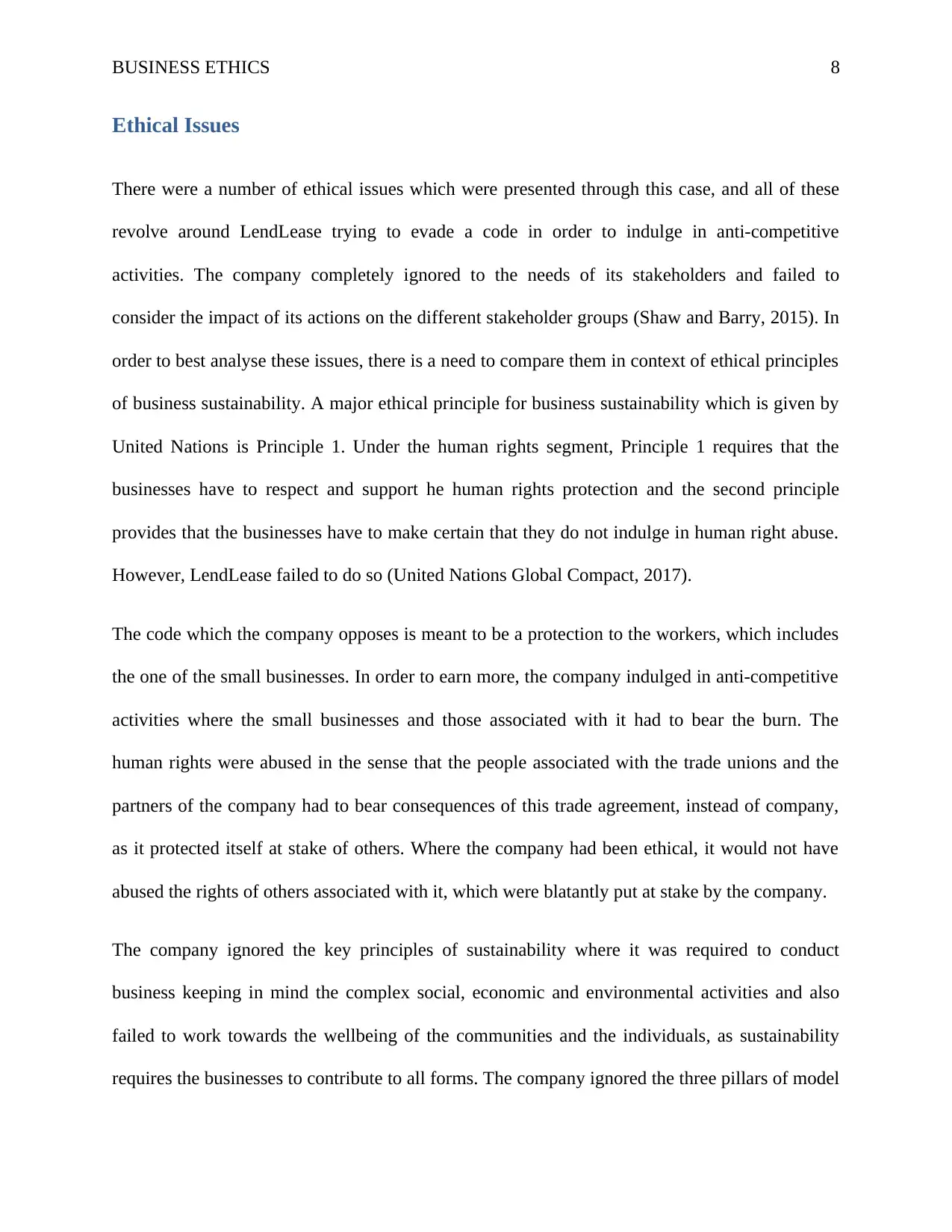
BUSINESS ETHICS 8
Ethical Issues
There were a number of ethical issues which were presented through this case, and all of these
revolve around LendLease trying to evade a code in order to indulge in anti-competitive
activities. The company completely ignored to the needs of its stakeholders and failed to
consider the impact of its actions on the different stakeholder groups (Shaw and Barry, 2015). In
order to best analyse these issues, there is a need to compare them in context of ethical principles
of business sustainability. A major ethical principle for business sustainability which is given by
United Nations is Principle 1. Under the human rights segment, Principle 1 requires that the
businesses have to respect and support he human rights protection and the second principle
provides that the businesses have to make certain that they do not indulge in human right abuse.
However, LendLease failed to do so (United Nations Global Compact, 2017).
The code which the company opposes is meant to be a protection to the workers, which includes
the one of the small businesses. In order to earn more, the company indulged in anti-competitive
activities where the small businesses and those associated with it had to bear the burn. The
human rights were abused in the sense that the people associated with the trade unions and the
partners of the company had to bear consequences of this trade agreement, instead of company,
as it protected itself at stake of others. Where the company had been ethical, it would not have
abused the rights of others associated with it, which were blatantly put at stake by the company.
The company ignored the key principles of sustainability where it was required to conduct
business keeping in mind the complex social, economic and environmental activities and also
failed to work towards the wellbeing of the communities and the individuals, as sustainability
requires the businesses to contribute to all forms. The company ignored the three pillars of model
Ethical Issues
There were a number of ethical issues which were presented through this case, and all of these
revolve around LendLease trying to evade a code in order to indulge in anti-competitive
activities. The company completely ignored to the needs of its stakeholders and failed to
consider the impact of its actions on the different stakeholder groups (Shaw and Barry, 2015). In
order to best analyse these issues, there is a need to compare them in context of ethical principles
of business sustainability. A major ethical principle for business sustainability which is given by
United Nations is Principle 1. Under the human rights segment, Principle 1 requires that the
businesses have to respect and support he human rights protection and the second principle
provides that the businesses have to make certain that they do not indulge in human right abuse.
However, LendLease failed to do so (United Nations Global Compact, 2017).
The code which the company opposes is meant to be a protection to the workers, which includes
the one of the small businesses. In order to earn more, the company indulged in anti-competitive
activities where the small businesses and those associated with it had to bear the burn. The
human rights were abused in the sense that the people associated with the trade unions and the
partners of the company had to bear consequences of this trade agreement, instead of company,
as it protected itself at stake of others. Where the company had been ethical, it would not have
abused the rights of others associated with it, which were blatantly put at stake by the company.
The company ignored the key principles of sustainability where it was required to conduct
business keeping in mind the complex social, economic and environmental activities and also
failed to work towards the wellbeing of the communities and the individuals, as sustainability
requires the businesses to contribute to all forms. The company ignored the three pillars of model
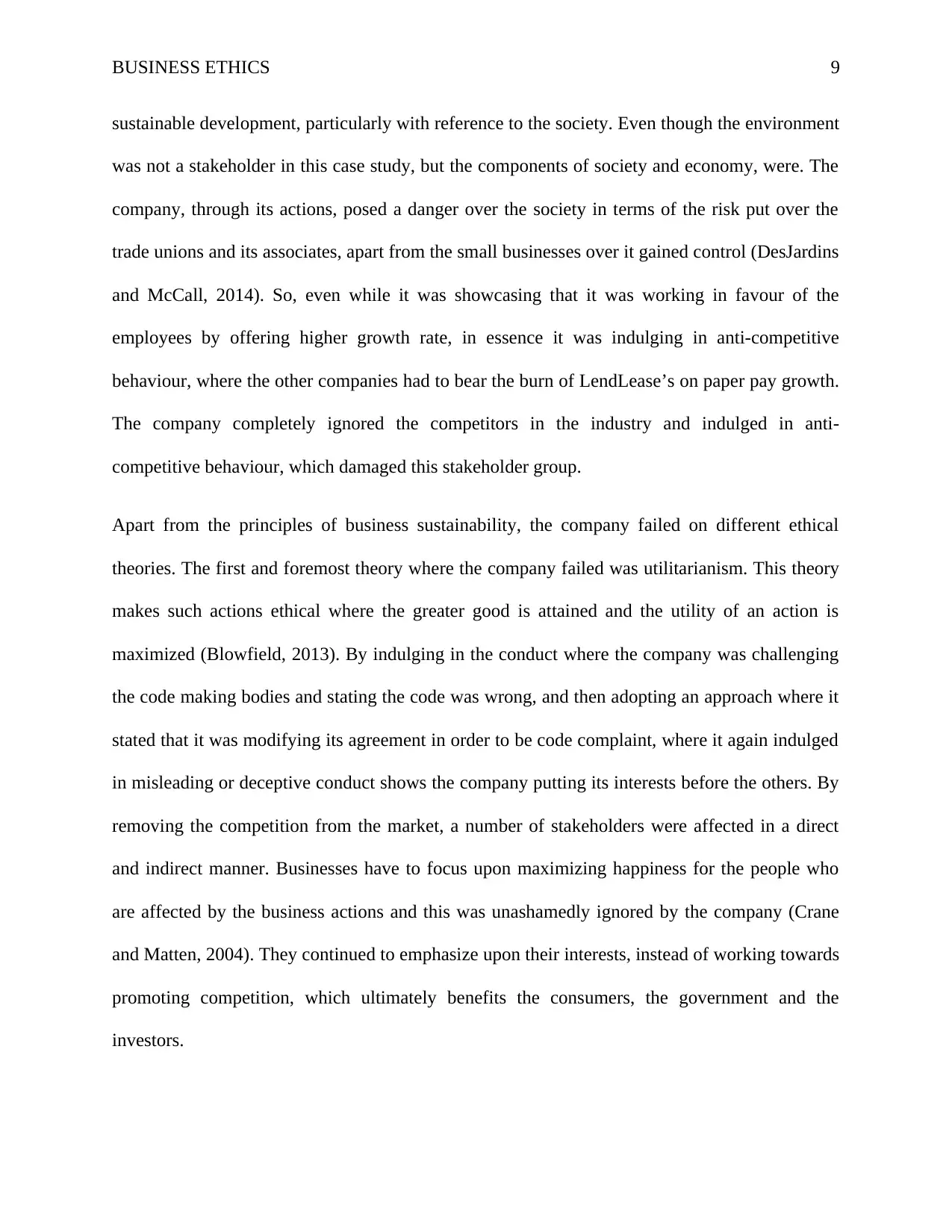
BUSINESS ETHICS 9
sustainable development, particularly with reference to the society. Even though the environment
was not a stakeholder in this case study, but the components of society and economy, were. The
company, through its actions, posed a danger over the society in terms of the risk put over the
trade unions and its associates, apart from the small businesses over it gained control (DesJardins
and McCall, 2014). So, even while it was showcasing that it was working in favour of the
employees by offering higher growth rate, in essence it was indulging in anti-competitive
behaviour, where the other companies had to bear the burn of LendLease’s on paper pay growth.
The company completely ignored the competitors in the industry and indulged in anti-
competitive behaviour, which damaged this stakeholder group.
Apart from the principles of business sustainability, the company failed on different ethical
theories. The first and foremost theory where the company failed was utilitarianism. This theory
makes such actions ethical where the greater good is attained and the utility of an action is
maximized (Blowfield, 2013). By indulging in the conduct where the company was challenging
the code making bodies and stating the code was wrong, and then adopting an approach where it
stated that it was modifying its agreement in order to be code complaint, where it again indulged
in misleading or deceptive conduct shows the company putting its interests before the others. By
removing the competition from the market, a number of stakeholders were affected in a direct
and indirect manner. Businesses have to focus upon maximizing happiness for the people who
are affected by the business actions and this was unashamedly ignored by the company (Crane
and Matten, 2004). They continued to emphasize upon their interests, instead of working towards
promoting competition, which ultimately benefits the consumers, the government and the
investors.
sustainable development, particularly with reference to the society. Even though the environment
was not a stakeholder in this case study, but the components of society and economy, were. The
company, through its actions, posed a danger over the society in terms of the risk put over the
trade unions and its associates, apart from the small businesses over it gained control (DesJardins
and McCall, 2014). So, even while it was showcasing that it was working in favour of the
employees by offering higher growth rate, in essence it was indulging in anti-competitive
behaviour, where the other companies had to bear the burn of LendLease’s on paper pay growth.
The company completely ignored the competitors in the industry and indulged in anti-
competitive behaviour, which damaged this stakeholder group.
Apart from the principles of business sustainability, the company failed on different ethical
theories. The first and foremost theory where the company failed was utilitarianism. This theory
makes such actions ethical where the greater good is attained and the utility of an action is
maximized (Blowfield, 2013). By indulging in the conduct where the company was challenging
the code making bodies and stating the code was wrong, and then adopting an approach where it
stated that it was modifying its agreement in order to be code complaint, where it again indulged
in misleading or deceptive conduct shows the company putting its interests before the others. By
removing the competition from the market, a number of stakeholders were affected in a direct
and indirect manner. Businesses have to focus upon maximizing happiness for the people who
are affected by the business actions and this was unashamedly ignored by the company (Crane
and Matten, 2004). They continued to emphasize upon their interests, instead of working towards
promoting competition, which ultimately benefits the consumers, the government and the
investors.
⊘ This is a preview!⊘
Do you want full access?
Subscribe today to unlock all pages.

Trusted by 1+ million students worldwide
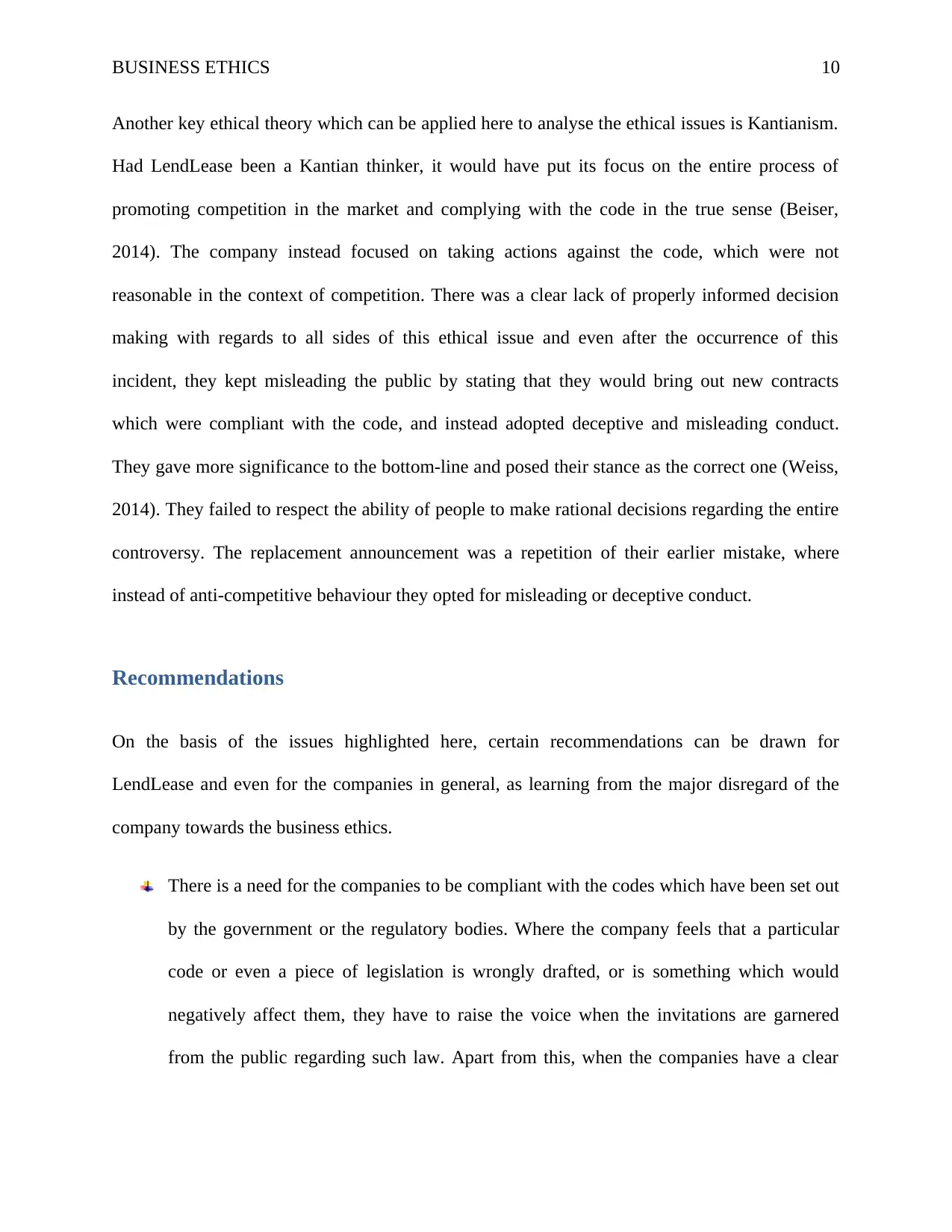
BUSINESS ETHICS 10
Another key ethical theory which can be applied here to analyse the ethical issues is Kantianism.
Had LendLease been a Kantian thinker, it would have put its focus on the entire process of
promoting competition in the market and complying with the code in the true sense (Beiser,
2014). The company instead focused on taking actions against the code, which were not
reasonable in the context of competition. There was a clear lack of properly informed decision
making with regards to all sides of this ethical issue and even after the occurrence of this
incident, they kept misleading the public by stating that they would bring out new contracts
which were compliant with the code, and instead adopted deceptive and misleading conduct.
They gave more significance to the bottom-line and posed their stance as the correct one (Weiss,
2014). They failed to respect the ability of people to make rational decisions regarding the entire
controversy. The replacement announcement was a repetition of their earlier mistake, where
instead of anti-competitive behaviour they opted for misleading or deceptive conduct.
Recommendations
On the basis of the issues highlighted here, certain recommendations can be drawn for
LendLease and even for the companies in general, as learning from the major disregard of the
company towards the business ethics.
There is a need for the companies to be compliant with the codes which have been set out
by the government or the regulatory bodies. Where the company feels that a particular
code or even a piece of legislation is wrongly drafted, or is something which would
negatively affect them, they have to raise the voice when the invitations are garnered
from the public regarding such law. Apart from this, when the companies have a clear
Another key ethical theory which can be applied here to analyse the ethical issues is Kantianism.
Had LendLease been a Kantian thinker, it would have put its focus on the entire process of
promoting competition in the market and complying with the code in the true sense (Beiser,
2014). The company instead focused on taking actions against the code, which were not
reasonable in the context of competition. There was a clear lack of properly informed decision
making with regards to all sides of this ethical issue and even after the occurrence of this
incident, they kept misleading the public by stating that they would bring out new contracts
which were compliant with the code, and instead adopted deceptive and misleading conduct.
They gave more significance to the bottom-line and posed their stance as the correct one (Weiss,
2014). They failed to respect the ability of people to make rational decisions regarding the entire
controversy. The replacement announcement was a repetition of their earlier mistake, where
instead of anti-competitive behaviour they opted for misleading or deceptive conduct.
Recommendations
On the basis of the issues highlighted here, certain recommendations can be drawn for
LendLease and even for the companies in general, as learning from the major disregard of the
company towards the business ethics.
There is a need for the companies to be compliant with the codes which have been set out
by the government or the regulatory bodies. Where the company feels that a particular
code or even a piece of legislation is wrongly drafted, or is something which would
negatively affect them, they have to raise the voice when the invitations are garnered
from the public regarding such law. Apart from this, when the companies have a clear
Paraphrase This Document
Need a fresh take? Get an instant paraphrase of this document with our AI Paraphraser
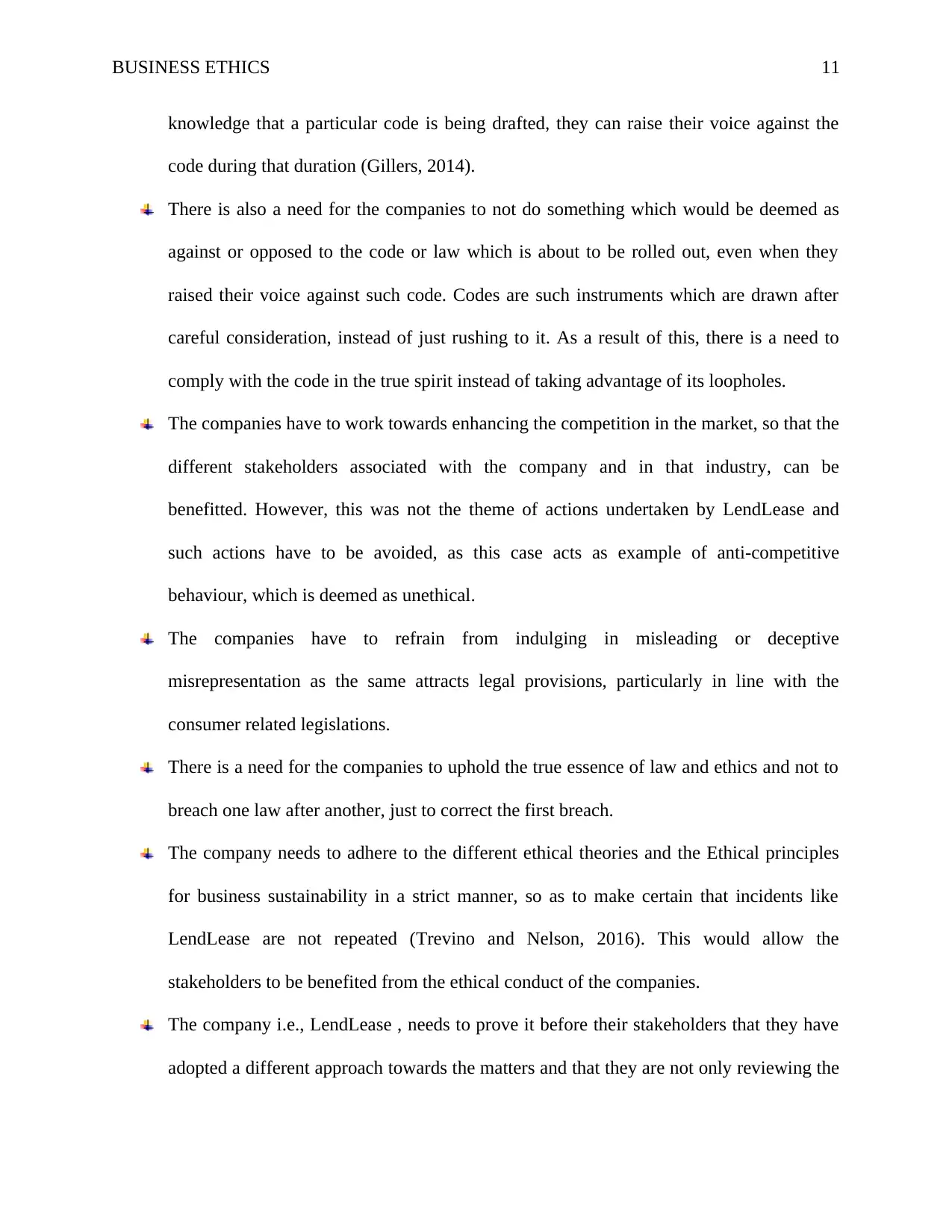
BUSINESS ETHICS 11
knowledge that a particular code is being drafted, they can raise their voice against the
code during that duration (Gillers, 2014).
There is also a need for the companies to not do something which would be deemed as
against or opposed to the code or law which is about to be rolled out, even when they
raised their voice against such code. Codes are such instruments which are drawn after
careful consideration, instead of just rushing to it. As a result of this, there is a need to
comply with the code in the true spirit instead of taking advantage of its loopholes.
The companies have to work towards enhancing the competition in the market, so that the
different stakeholders associated with the company and in that industry, can be
benefitted. However, this was not the theme of actions undertaken by LendLease and
such actions have to be avoided, as this case acts as example of anti-competitive
behaviour, which is deemed as unethical.
The companies have to refrain from indulging in misleading or deceptive
misrepresentation as the same attracts legal provisions, particularly in line with the
consumer related legislations.
There is a need for the companies to uphold the true essence of law and ethics and not to
breach one law after another, just to correct the first breach.
The company needs to adhere to the different ethical theories and the Ethical principles
for business sustainability in a strict manner, so as to make certain that incidents like
LendLease are not repeated (Trevino and Nelson, 2016). This would allow the
stakeholders to be benefited from the ethical conduct of the companies.
The company i.e., LendLease , needs to prove it before their stakeholders that they have
adopted a different approach towards the matters and that they are not only reviewing the
knowledge that a particular code is being drafted, they can raise their voice against the
code during that duration (Gillers, 2014).
There is also a need for the companies to not do something which would be deemed as
against or opposed to the code or law which is about to be rolled out, even when they
raised their voice against such code. Codes are such instruments which are drawn after
careful consideration, instead of just rushing to it. As a result of this, there is a need to
comply with the code in the true spirit instead of taking advantage of its loopholes.
The companies have to work towards enhancing the competition in the market, so that the
different stakeholders associated with the company and in that industry, can be
benefitted. However, this was not the theme of actions undertaken by LendLease and
such actions have to be avoided, as this case acts as example of anti-competitive
behaviour, which is deemed as unethical.
The companies have to refrain from indulging in misleading or deceptive
misrepresentation as the same attracts legal provisions, particularly in line with the
consumer related legislations.
There is a need for the companies to uphold the true essence of law and ethics and not to
breach one law after another, just to correct the first breach.
The company needs to adhere to the different ethical theories and the Ethical principles
for business sustainability in a strict manner, so as to make certain that incidents like
LendLease are not repeated (Trevino and Nelson, 2016). This would allow the
stakeholders to be benefited from the ethical conduct of the companies.
The company i.e., LendLease , needs to prove it before their stakeholders that they have
adopted a different approach towards the matters and that they are not only reviewing the
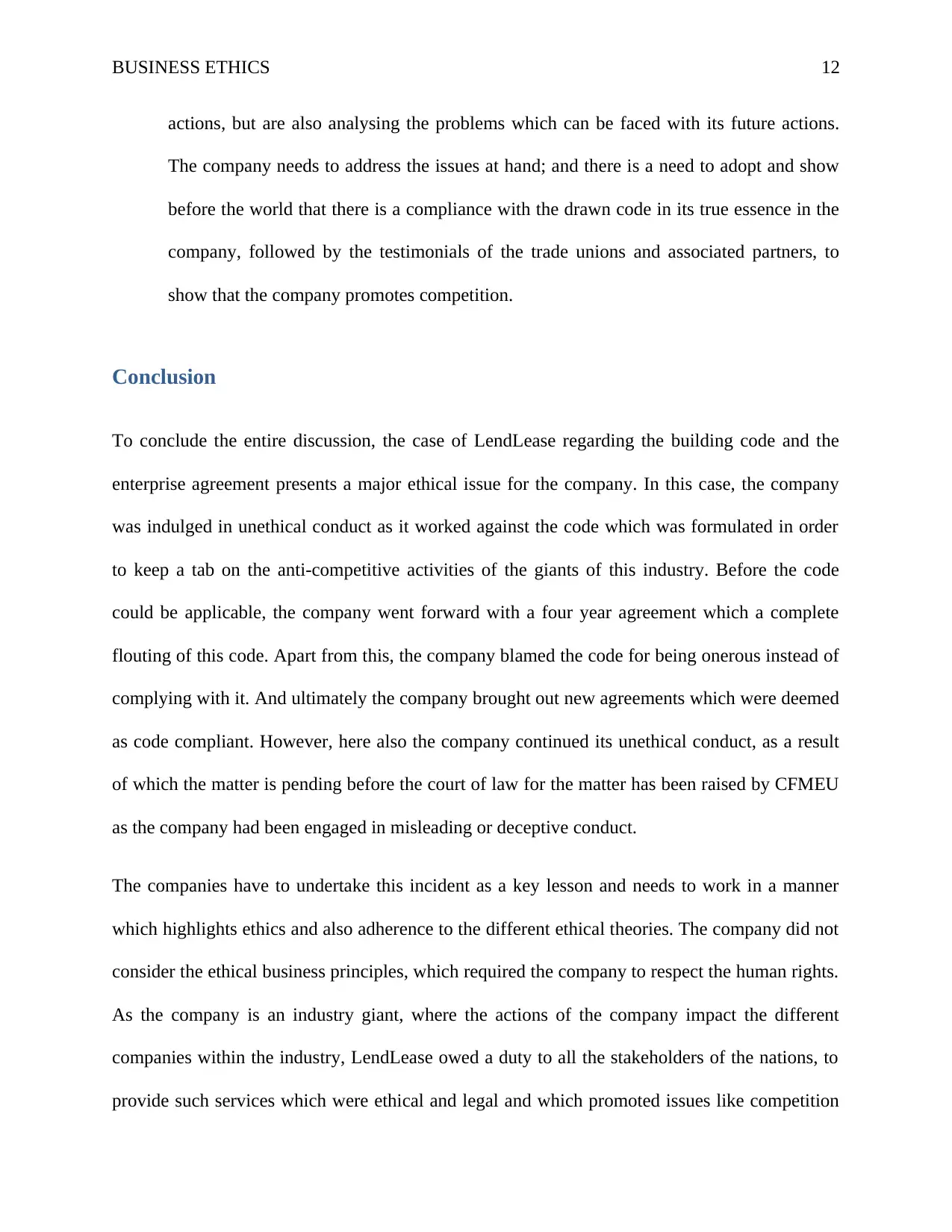
BUSINESS ETHICS 12
actions, but are also analysing the problems which can be faced with its future actions.
The company needs to address the issues at hand; and there is a need to adopt and show
before the world that there is a compliance with the drawn code in its true essence in the
company, followed by the testimonials of the trade unions and associated partners, to
show that the company promotes competition.
Conclusion
To conclude the entire discussion, the case of LendLease regarding the building code and the
enterprise agreement presents a major ethical issue for the company. In this case, the company
was indulged in unethical conduct as it worked against the code which was formulated in order
to keep a tab on the anti-competitive activities of the giants of this industry. Before the code
could be applicable, the company went forward with a four year agreement which a complete
flouting of this code. Apart from this, the company blamed the code for being onerous instead of
complying with it. And ultimately the company brought out new agreements which were deemed
as code compliant. However, here also the company continued its unethical conduct, as a result
of which the matter is pending before the court of law for the matter has been raised by CFMEU
as the company had been engaged in misleading or deceptive conduct.
The companies have to undertake this incident as a key lesson and needs to work in a manner
which highlights ethics and also adherence to the different ethical theories. The company did not
consider the ethical business principles, which required the company to respect the human rights.
As the company is an industry giant, where the actions of the company impact the different
companies within the industry, LendLease owed a duty to all the stakeholders of the nations, to
provide such services which were ethical and legal and which promoted issues like competition
actions, but are also analysing the problems which can be faced with its future actions.
The company needs to address the issues at hand; and there is a need to adopt and show
before the world that there is a compliance with the drawn code in its true essence in the
company, followed by the testimonials of the trade unions and associated partners, to
show that the company promotes competition.
Conclusion
To conclude the entire discussion, the case of LendLease regarding the building code and the
enterprise agreement presents a major ethical issue for the company. In this case, the company
was indulged in unethical conduct as it worked against the code which was formulated in order
to keep a tab on the anti-competitive activities of the giants of this industry. Before the code
could be applicable, the company went forward with a four year agreement which a complete
flouting of this code. Apart from this, the company blamed the code for being onerous instead of
complying with it. And ultimately the company brought out new agreements which were deemed
as code compliant. However, here also the company continued its unethical conduct, as a result
of which the matter is pending before the court of law for the matter has been raised by CFMEU
as the company had been engaged in misleading or deceptive conduct.
The companies have to undertake this incident as a key lesson and needs to work in a manner
which highlights ethics and also adherence to the different ethical theories. The company did not
consider the ethical business principles, which required the company to respect the human rights.
As the company is an industry giant, where the actions of the company impact the different
companies within the industry, LendLease owed a duty to all the stakeholders of the nations, to
provide such services which were ethical and legal and which promoted issues like competition
⊘ This is a preview!⊘
Do you want full access?
Subscribe today to unlock all pages.

Trusted by 1+ million students worldwide
1 out of 16
Related Documents
Your All-in-One AI-Powered Toolkit for Academic Success.
+13062052269
info@desklib.com
Available 24*7 on WhatsApp / Email
![[object Object]](/_next/static/media/star-bottom.7253800d.svg)
Unlock your academic potential
Copyright © 2020–2025 A2Z Services. All Rights Reserved. Developed and managed by ZUCOL.





